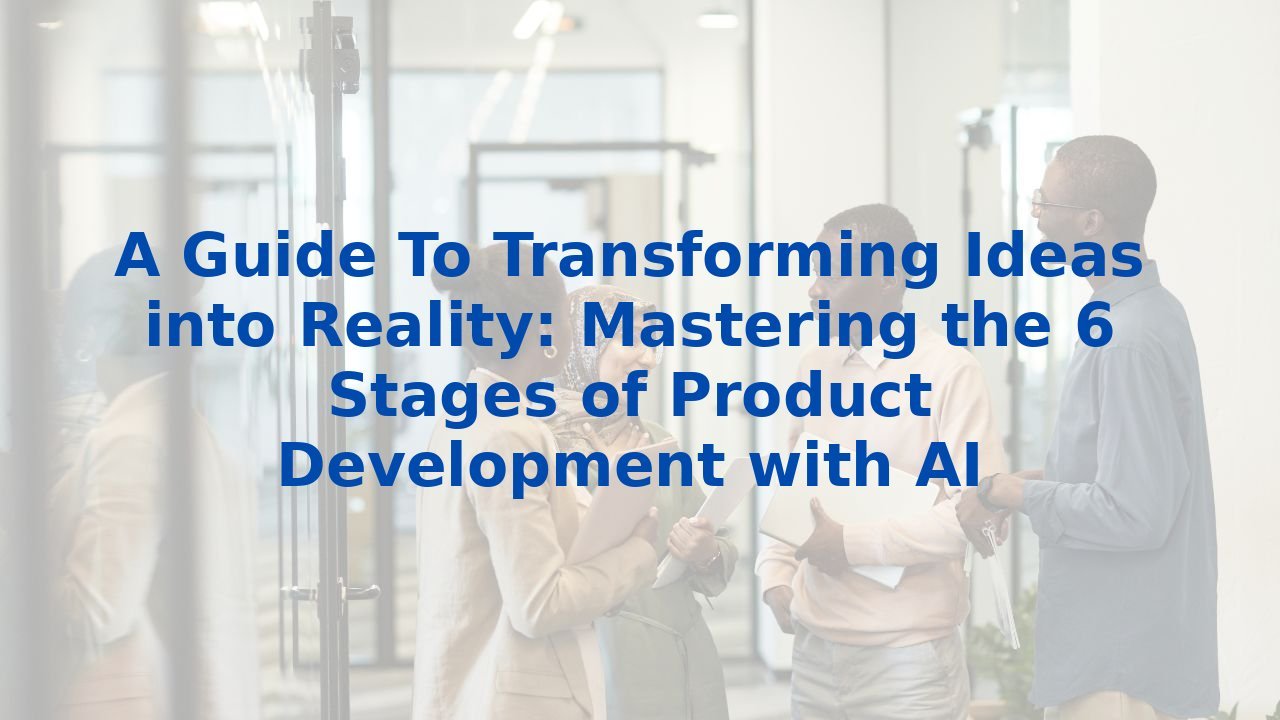A Guide To Transforming Ideas into Reality: Mastering the 6 Stages of Product Development with AI
A Guide To Transforming Ideas into Reality: Mastering the 6 Stages of Product Development with AI
Introduction
In today’s dynamic business landscape, transforming innovative ideas into tangible products requires more than mere creativity; it calls for strategic planning, precise execution, and unwavering adaptability. Understanding the six pivotal stages of product development—product analysis, business plan, market research, prototyping, production, and distribution—enables organizations to craft successful products. By infusing artificial intelligence (AI) into these stages, companies can enhance their efficiency, leading to a seamless product development experience.
1. Product Analysis
Enhanced Insights with AI
The first step, product analysis, lays the groundwork for successful product development. AI’s prowess in swiftly analyzing vast datasets elevates this stage substantially. With its ability to recognize market trends, uncover customer needs, and assess product feasibility, AI leads to informed decision-making. Embracing machine learning algorithms helps organizations derive insights that fuel the product development process, allowing them to pivot intelligently based on real-time data.
2. Business Plan
Data-Driven Decision Making
Creating a robust business plan is essential for product success. Here, AI shines by offering data-driven insights that bolster business strategies. By analyzing financial metrics, customer behaviors, and market trends, AI tools equip organizations with predictive analytics that ensure their business plans are not only realistic but also aligned with future interests.
3. Market Research
AI-Powered Market Insights
Market research is a cornerstone of product development. With AI, this process becomes highly efficient. By automating the collection and analysis of market data, AI provides profound insights that can direct product positioning and marketing strategies. Understanding customer behavior patterns, AI aids in crafting targeted marketing campaigns while identifying exciting new market opportunities.
4. Prototyping
AI-Driven Innovation
When it comes to prototyping, AI acts as a catalyst for innovation. This stage transforms abstract ideas into tangible products, and AI enhances this process by automating repetitive design tasks. Generative AI technology helps streamline prototype development, accelerating the cycle and reducing costs while maintaining quality and precision.
5. Production
Efficient Production with AI
Once a prototype is validated, production takes center stage. AI helps optimize manufacturing processes by accurately predicting demand fluctuations, better managing inventory, and proposing efficient shipping routes. These enhancements minimize delays and carrying costs, contributing to a more agile and responsive supply chain ecosystem.
6. Distribution
AI-Driven Logistics
The final stage, distribution, is where AI truly demonstrates its impact. By optimizing logistics, AI ensures timely and efficient delivery. Real-time data analysis allows organizations to foresee delivery times, manage inventory levels proactively, and adapt distribution strategies in response to evolving customer demands.
Benefits of AI in Product Development
Efficiency and Productivity Gains
Implementing AI significantly boosts efficiency and productivity throughout product development. By automating routine tasks, AI allows your human resources to concentrate on higher-order activities like strategic thinking and innovation. This shift not only reduces costs associated with traditional manual labor but also enhances overall workplace productivity.
Improved Decision Making
AI empowers organizations to make quick, accurate decisions. Analyzing vast datasets in real-time, AI translates complex information into actionable insights that foster informed decision-making. This is particularly essential in competitive environments where swift choices can significantly influence profitability.
Enhanced Customer Experience
Personalization is key in today’s market, and AI helps craft exceptional customer experiences by analyzing preferences and behaviors. This capability translates into hyper-targeted product recommendations and highly tailored marketing messages, amplifying customer satisfaction and loyalty.
Training Employees for AI
Despite the transformative potential of AI, organizations must prioritize training employees in effective AI tool utilization. Here’s why this investment is impactful:
- Skill Enhancement: Employees trained in AI develop vital skills that enable them to work seamlessly with AI technologies.
- Adaptability: Understanding AI equips employees to adapt swiftly to new technologies and processes.
- Problem-Solving: AI training enhances critical thinking and problem-solving capabilities, essential for navigating complex product development challenges.
- Innovation: Familiarity with AI encourages a culture of innovation, allowing employees to contribute novel ideas and solutions.
Conclusion
In summary, AI is revolutionizing the product development landscape, significantly enhancing each of the six stages—from product analysis to distribution. By leveraging AI to glean insights, automate processes, and optimize workflows, organizations stand to benefit immensely in terms of efficiency and productivity. Furthermore, investing in comprehensive AI training empowers teams to harness these tools effectively, culminating in a remarkable journey of turning ideas into reality.



